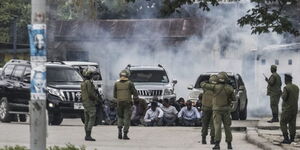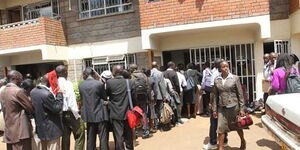Lawyer Danstan Omari on Tuesday, June 17, challenged the allegations made by Police Constable James Mukhwana, which detailed the events leading to the death of blogger Albert Ojwang.
On Monday, Mukhwana's recollection of Ojwang's death stole headlines as the Nairobi Central Police Station-based constable implicated Deputy Inspector General of Police Eliud Lagat and OCS Samson Talaam in the death.
While responding to Mukhwana’s testimony submitted to the Independent Policing Oversight Authority (IPOA), Omari was adamant that the credibility of such statements can only be determined once they are subjected to scrutiny in court.
“The statement of Mukhwana has not been put into cross-examination, and that is why the country needs to be very careful,” said Omari. “Once it is tested in court, that is when the veracity of the statement comes in.”
According to Omari, the legal weight of any statement is only established when tested against evidence, corroboration, and cross-examination.
“IPOA will record a thousand statements. Others will record statements based on what they are instructed to do. Others will record statements based on what they saw. Others will record statements based on what they hear. The quality of the statement and evidence comes in when it is put to the test,” Omari stated during a morning Radio show.
“The quality of the statement will also improve when it is corroborated. When others who were present are of a different view, then that statement becomes just a statement.”
Omari has been at the heart of the case involving Ojwang's death, representing OCS Talaam at the Milimani Law Courts on Monday during a heated court session.
While citing Sections 385 and 386 of Kenya’s Criminal Procedure Code (Cap 75), Omari underlined legal procedures that must be followed whenever a suspect dies in police custody.
As per the CPC Cap 75, after any death in a police cell, circumstances must be established through an inquest. The first complainant who triggered this process comes and testifies. Afterwards, anybody who has information or was around is allowed to give evidence in an inquest before a finding is made.
Omari explained that upon conclusion of the inquest, the file is submitted to the Director of Public Prosecutions (DPP), who then evaluates whether the evidence meets the legal threshold to charge any suspect.
Bearing this in mind, the lawyer faulted the manner in which investigations were being conducted in Ojwang's murder, saying it gave room for a cover-up of the blogger's real killers.
“What we are doing now is the reverse of what the law says,” the lawyer cautioned. “It is very easy in such an investigation to find a cover-up. In an inquest, the public participates, and anyone with evidence comes forward.”












